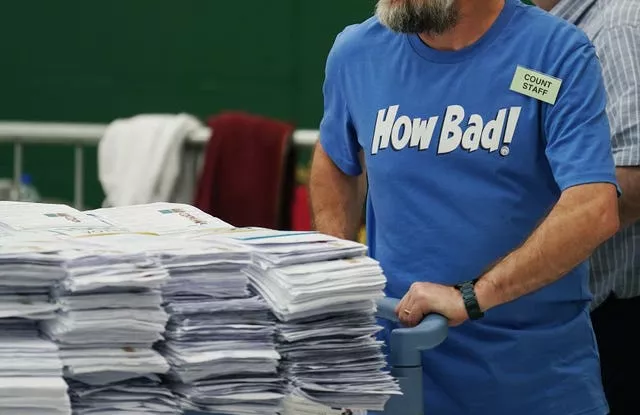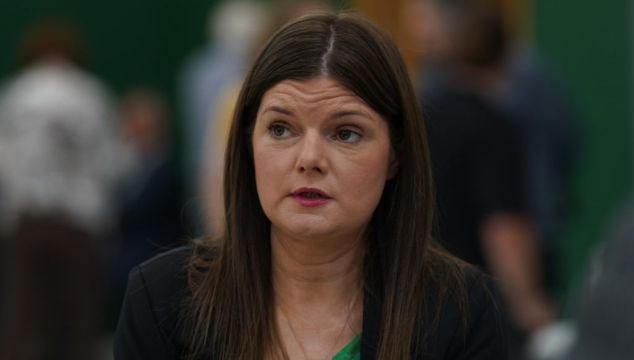Transfers have put Sinn Féin’s Kathleen Funchion “in contention” to be elected as one of Ireland’s 14 MEPs.
Ms Funchion got 61 per cent of transfers from her running mate Paul Gavan’s eliminated share, propelling her into second place.
The huge transfer rate has positioned the Carlow-Kilkenny TD to take one of the five seats in the Ireland South constituency, though political commentators have said transfers make it “impossible” to predict.
Fianna Fáil MEP Billy Kelleher is on 100,832 and is creeping closer to the quota.
In the hunt behind Ms Funchion, on 71,350 votes, are Independent Clare TD Michael McNamara (67,507 votes), Fianna Fail’s Cynthia Ni Mhurchu (61,780), and outgoing MEP Mick Wallace (61,668).
There is an outside chance for outgoing Green Party MEP Grace O’Sullivan (54,978), though it looks increasingly unlikely.
Observers at the count centre will watch closely whether other candidates can attract enough transfers to leap ahead.

Mr Wallace is expecting to do well from the 26,167 votes of Independent Ireland’s Eddie Punch, who was eliminated after the 14th count, while Ms Ni Mhurchu is expected to pull transfers from Fine Gael’s John Mullins.
Sinn Féin TD David Cullinane said there was still “a long, long way to go, there’s a lot of transfers out there”.
“We were hoping to have a very strong transfer rate so I think we’ve got well over 60 per cent which is the hope for us coming into the count today so obviously it puts Kathleen in contention,” he said on Wednesday evening.
“So it’s still impossible to call who’s going to get the last number of seats but obviously we’re competing which is what you want to be. I don’t think anybody can call it still. All we can do is keep watching the number of transfers.
“I still think that Grace O’Sullivan’s transfers, if she’s eliminated, will probably decide the outcome of it for two of the candidates.
“I think Grace is a bit too far behind at this point. Eventually if she is eliminated her transfers will decide, I think, who is taking the final two seats.”

The “meticulous” count continued in Cork on Wednesday to fill four of the five seats for the Ireland South constituency, with all five seats left to be filled in Midlands-North-West.
Fine Gael’s Sean Kelly was elected on the first count on Monday night, leaving 22 candidates vying for four seats in the 10-county constituency.
The process of transferring votes between the South’s candidates, as per Ireland’s proportional representation, has taken longer than had been estimated by observers at Nemo Rangers GAA Club in Cork.
The 2019 European election saw a recount in Ireland South that lasted days, after just over 300 votes separated Sinn Fein’s incumbent MEP Liadh Ni Riada and Ms O’Sullivan, a former Greenpeace activist.
Asked if the prospect of another taxing recount is looming for count staff in the Cork sports hall, and whether that is extending proceedings, returning officer Martin Harvey told the PA news agency: “We’re always meticulous, recount or not.”

He said the ballot papers are very long, which makes sorting them more difficult, but added that the counters have “got to grips with that by now, and they’re moving through it much quicker”.
“I don’t think any of these counters would even think about the recount situation, honestly. We’d always do a very, very thorough search and check.
“Every paper is checked and double-checked, every single cards that are completed with 50 votes are signed by two people and then checked by supervisors.
“That is the procedure we have used in general elections, in referenda, and this election previously and now.
“We are extremely careful. And the previous recount showed that, when we went to do the recount, it showed there was no real change in the situation after part of the recount and then they decided to call it off.”
Deirdre Clune, who was the last MEP to be elected to the Ireland South constituency in 2019, said she does not have the “knot in my stomach that you would have normally when you’re in this position”.
She added: “You can’t tell how these transfers are going to go. That seems to be the common theme from every political camp you speak to – nobody knows, there is no pattern at all. It’s not geography, it’s not female, it doesn’t even seem to be party political or whether you’re right wing or left leaning.
“So it’s very difficult to predict how these last seats will go.
“There could be a pocket of votes there, a surprise 10,000 votes for somebody, a 5,000 that they weren’t expecting that would push them ahead of another, so anybody who thinks they can predict this, I think, they’re trying to fool us, because you can’t. There is no way of predicting it.”







